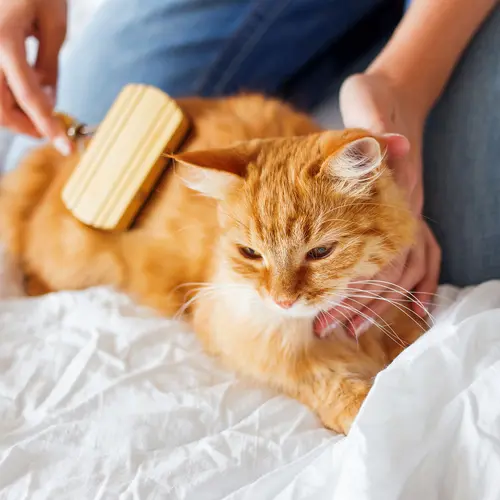Is it time to take your cat to the vet for a checkup?
"I think people sometimes don't go [to the vet] because they think their cat's shots aren't due. But cats should be seen at least once a year," says veterinarian Brian Collins, DVM, lecturer at Cornell University College of Veterinary Medicine's Companion Animal Hospital. "I like to check them every 6 months if possible."
At "well-cat" visits, probably the most important thing is for your cat to get a "nose to tail" physical exam, Collins says.
During the appointment, which can last from 15 to 30 minutes, your veterinarian will check all over your cat's body, looking for signs of disease or anything unusual. For example, he will examine the cat's ears for parasites, such as ear mites. He'll look at the eyes for general retinal health, peer inside your cat's mouth to look for signs of tartar or gum disease, listen to the cat's heart and lungs, and survey the skin for any lesions or bumps. "Basically, we're just looking to see if everything is normal," Collins says.
The vet will also weigh your cat and assign a body conditioning number from 1 to 9 (or 1 to 5, depending on the scale your vet uses). "The higher the number, the fatter the cat," Collins says.
Ideally, you want your cat to score in the middle range, or a 5 on the 1 to 9 scale, which means the cat is at the appropriate weight. "The problems we tend to see most with cats are obesity and dental disease," says Collins, who notes that obesity is usually more of a problem with older, indoor cats.
Cat Vaccinations
Your cat may get vaccinations during the visit, depending partly on its age, Collins says.
Kittens usually get a series of vaccinations for distemper, upper respiratory disease, and rabies. But cats are not necessarily routinely vaccinated for other infectious diseases, such as feline leukemia. "It sort of depends on the lifestyle of the cat," Collins says. Cats with prolonged contact with other cats are at highest risk but any kitty that goes outdoors can get feline leukemia. Ask your vet if the vaccine is right for your feline.
Outdoor cats are at a higher risk of disease in general, including viral and parasitic infections. Indoor cats that occasionally get outdoors are often unprotected from infectious diseases as well.
Vaccines for other diseases can vary from annually to every 3 years, depending on the type of vaccine and your vet's philosophy, Collins says. "When we're trying to determine what vaccinations a cat gets, we always look at each one as an individual rather than as one recommendation for all cats."
Vet Visit Tips
There are ways to make the well-cat visit less stressful for your pet.
"The best thing is starting early," Collins says. Ideally, it's best to take your cat for car rides as a kitten and get the cat used to a carrier. Buy a carrier that's comfortable for your cat. Take it out of storage a few days before the visit and make it a safe, fun place, filled with treats or toys, to help make the trip to the vet less stressful.
Once at the office, putting a blanket or towel over the carrier may keep the cat calm.
Another key part of a well-cat visit is to build a relationship with your vet. "It's so important," Collins says. "We really focus on preventive care," which can help keep your pet healthy for years to come.

